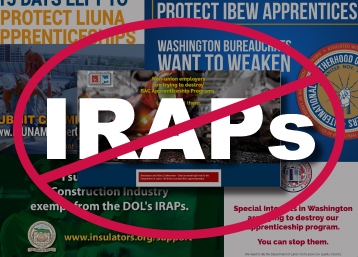From the International level and down, unions are rallying their members to tell the U.S. Department of Labor Industry-Recognized Apprenticeship Programs, also known as IRAPs, do not belong in the construction industry.
With the potential fate of registered apprenticeships hanging in the balance, North America’s Building Trades Unions, SMART, other International Unions and are reaching out to all members and urging them to take action and comment against the implantation of IRAPs before the Aug. 26 deadline.
In June, the DOL issued a Notice of Proposed Rulemaking (NPRM) to establish a process for the DOL to create IRAPs. As part of President Trump’s push to further expand apprenticeships, the DOL created IRAPs to implement in industries currently lacking such training.
While IRAPs will be beneficial in some industries, they could cause irreparable harm to registered apprenticeships within the union construction industry.
Unlike registered apprenticeship program, such as those of SMW 24, IRAPs would allow private organizations, such as employers and trade associations, the ability to create their own apprenticeship programs, but not be subject to the same stringent regulations as registered programs.
Registered building trades apprenticeship programs were designed to help recruit, train and retain workers through progressive wage increases; establish apprentice-to-journeymen ratios that promote safety; provide quality assurance assessments by the government; establish uniform standards and mandatory safety training; create instructor eligibility requirements and ensure transparency requirements.
IRAPs differ from registered apprenticeships because they are not regulated by the government and give employers, including anti-union contractors affiliated with the Associated Builders and Contractors, the ability to train construction workers without any regulations or governmental oversight.
This means they do not have to follow the same rules as registered apprenticeship programs, creating a race to the bottom in terms of training.
According to a fact sheet on the North America’s Building Trades Unions website, IRAPs in the construction industry would jeopardize both the quality of construction and the safety and security of the construction workforce, weakening communities across the country where these workers reside and are needed.
Fortunately, the DOL provide a temporary exemption for the construction industry from IRAPs. The temporary rule could change when the DOL issues the final version of the regulation and IRAPs could be allowed in construction.
During the DOL’s current comment period on this ruling, ABC is working to get Industry-Recognized Apprentices Programs implemented.
Building trades unions, on the other hand, are in the process of urging their members to comment to the DOL and say the temporary industry exclusion should be made permanent.
Sheet Metal Workers Local 24 urges members to comment through the link, SaveSMARTapprenticeships.org.
The comment period ends on Aug. 26.

